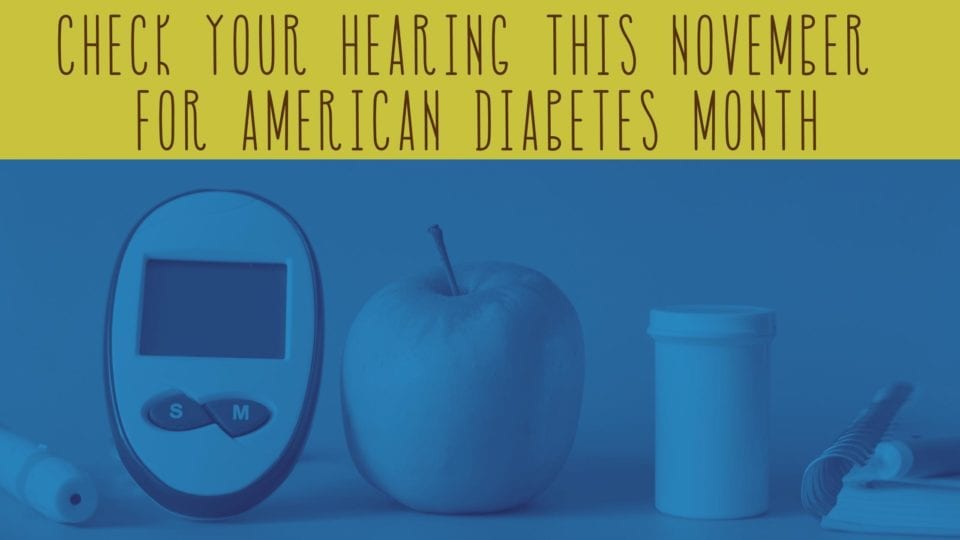- A Closer Look at Common Myths About Hearing Loss - May 7, 2024
- The Impact of Pets on Emotional and Hearing Health - April 26, 2024
- Strategies for Coping with Single-Sided Deafness - April 16, 2024
The Centers for Disease Control reports that approximately 463 million adults have diabetes worldwide. In the United States alone, 10.5% of the population, or 34.2 million adults live with this condition. Perhaps even more alarming is that you may have it and not even know it. Undetected and uncontrolled diabetes can result in long-term health effects such as high blood pressure that can damage several parts of the body including the heart, blood vessels, kidneys, nerves, and eyes. Now more and more studies are finding that your hearing may also be at risk. This November is National Diabetes Month, a time to raise awareness around this devastating condition. This year’s focus is on prediabetes and preventing diabetes, which we are finding could also prevent permanent hearing loss.
Understanding diabetes
Several types of diabetes essentially inhibit the body’s ability to create and properly disperse insulin. This causes glucose to build up in the bloodstream rather than providing nourishment to the cells of the body. The most common types of diabetes are type one, type 2, and prediabetes.
Type 1 diabetes is an autoimmune condition that causes the body to be unable to produce the insulin required to move glucose into cells. Although type 1 diabetes can present itself at any age, it most commonly happens in children either 4 and 7 years old, or between 10 and 14 years old.
Type 2 diabetes commonly occurs due to lifestyle and dietary choices at any age, though usually in adults. While insulin is produced, the body loses the ability to properly absorb insulin into the cells of the body.
Prediabetes occurs when blood sugar levels are higher than considered safe but not high enough to be considered type 2 diabetes. Alarmingly, of the estimated 88 million people in the US with this condition, over 84% don’t know they have it. Over three to five years, about 25% of people with prediabetes develop full-blown diabetes, however, over the long term, the percentage rises significantly. This is why it is important to use American Diabetes Month as a wake-up call!
Health risks of diabetes
The American Diabetes Association recommends that everyone should be screened for diabetes every three years after 45, especially for those with increased likeliness. If there are other risk factors present, such as family history, screenings should be done more frequently at an earlier age. If you find you must frequently urinate, have increased thirst, sleeplessness, blurred vision, or slow healing infections it could indicate diabetes.
Diabetes Increases the risk of hearing loss
While scientists have not completely confirmed why diabetes seems to affect hearing, several studies demonstrate a higher likelihood of sustaining hearing damage when diabetes is not addressed and properly treated. A 2008 study conducted by the National Institutes of Health (NIH), found that those with diabetes were more than twice as likely to have mild to moderate hearing loss than those without the condition. Similarly, a 2012 study published in the Journal of Clinical Endocrinology & Metabolism analyzed results from 13 studies involving more than 20,000 participants, confirming that diabetes increased the risk of hearing loss regardless of age.
How diabetes affects hearing
Researchers suspect that high blood glucose levels present in people with diabetes can cause damage to the small blood vessels in the inner ear. The blood vessels in the inner ear are responsible for sending sound information to the brain and when these vessels are deprived of adequate oxygen, they become damaged or destroyed – causing permanent hearing loss.
Protect your hearing if you have diabetes
If you have diabetes, it is important to take extra care to manage the condition. Talk to your doctor about creating a regular exercise plan you can follow. Check your blood sugar levels daily, and make sure to eat a healthy diet that avoids processed sugars. Although hearing loss caused by diabetes is permanent, it can be treated using hearing aids. These devices can amplify the sound around you so you can be sure to hear what is being said and the audio world around you.
If you have recently been diagnosed with diabetes, make sure to schedule a visit with our team. The sooner you address your hearing loss, the sooner you can enjoy the sounds and conversations in your life. Call today!

